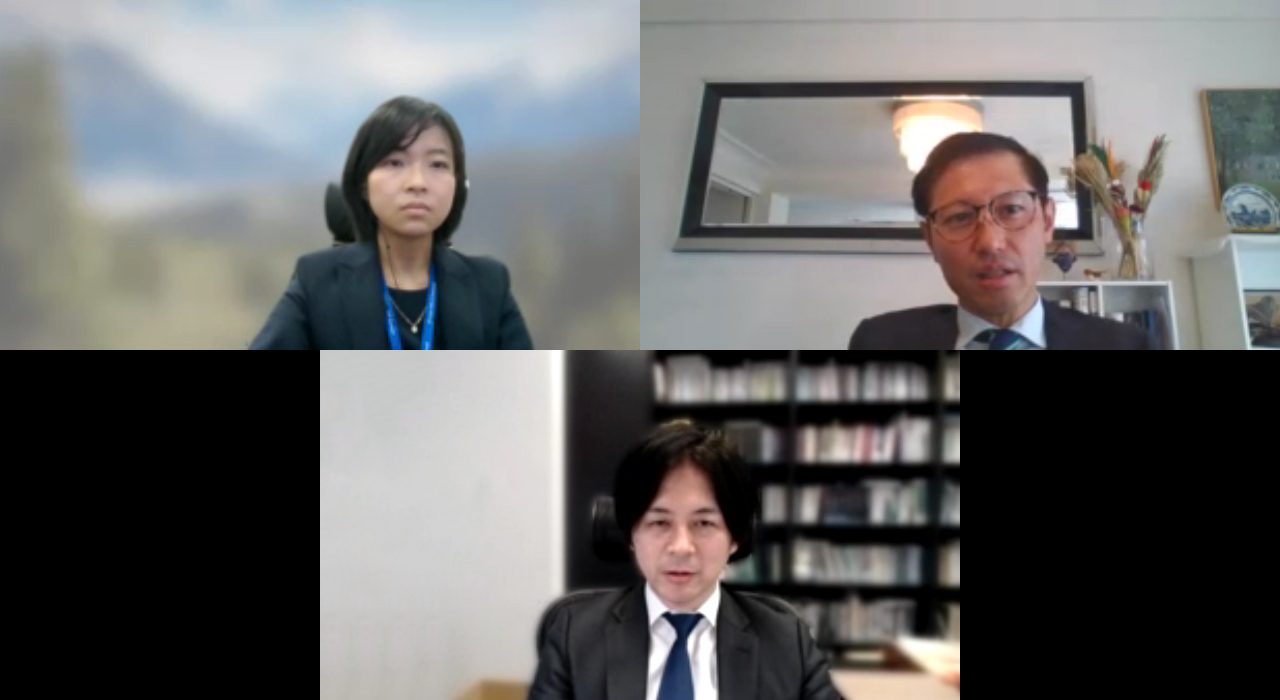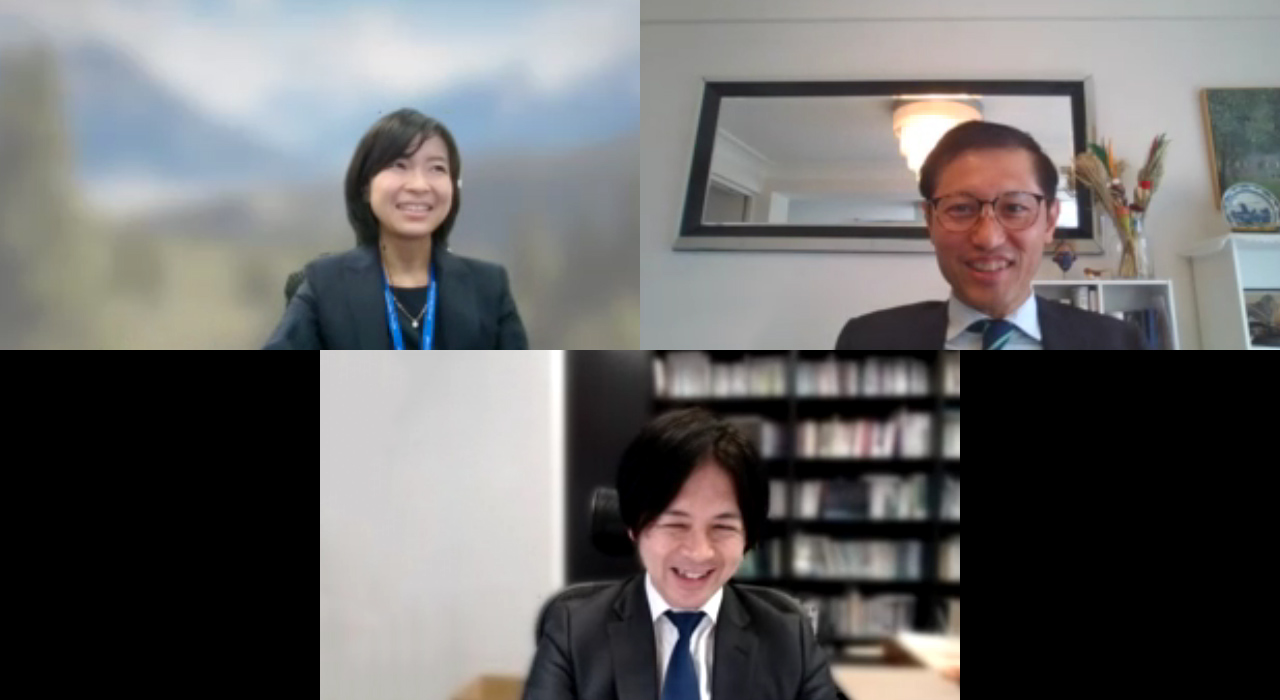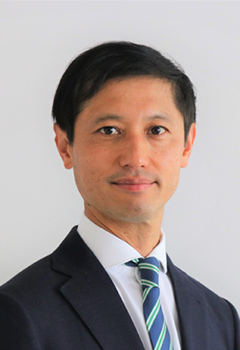

Lately, global-level issues and the UN’s 17 Sustainable Development Goals (SDGs) that indicate the goals for solving these issues have been drawing more attention. At Anderson Mōri & Tomotsune, we as legal professionals continue to look for ways to contribute to achieving these SDGs. Our lawyers have developed a wealth of SDG-related expertise in their respective fields and have put these resources at the disposal of our clients, helping them find best practice-based solutions to the many legal issues that attach to sustainable development.
In this special feature, we introduce some of the activities that have allowed our lawyers not only to commit our Firm to the UN’s SDGs, but also to position our Firm as a leader in the field of sustainability law.
In this feature, we interview Masato Imai, Managing Executive Officer (Head of Global Banking, Co-Chief Sustainability Officer) of the Norinchukin Bank.
*Date of the interview: April 24, 2023, conducted online.
Feature #9: Thinking Through Financial Institutions and Sustainability with Mr. Imai of the Norinchukin Bank
(Interview with Masato Imai, Managing Executive Officer (Head of Global Banking, Co-Chief Sustainability Officer) of the Norinchukin Bank, conducted by Kei Sasaki, Partner at AMT and Nao Okada, Associate at AMT)
Table of Contents:
Q1The Norinchukin Bank’s role and sustainability
Q2The Bank’s view of sustainability
Q3Difference between Japan and the world’s perception of sustainability
Q4The Bank’s unique style of addressing sustainability
Q5Achieving balance between investments and economic benefits, making focused investments
Q6Similarities with and importance of drafting agreements
Q7Possible collaboration with other financial institutions
Q1:The Norinchukin Bank’s role and sustainability
SasakiThank you for joining us today. Before we begin, please introduce to us the Norinchukin Bank (the “Bank”).
Mr. ImaiThank you for your invitation. The Bank is a cooperative organization that supports agriculture, forestry, and fishery and we are a nation-wide organization. Our primary role is to provide financial services to the people who are engaged in agriculture, forestry, and fishery. We receive deposits nation-wide and we have funds that are world class. Our secondary role is to invest our funds as investors and return the profits to Japan. Investing in sustainably is a particularly important issue today.
SasakiWhat is the relationship between the Bank and sustainability?
Mr. ImaiIn relation to sustainability, which is today’s topic, agriculture, forestry, and fishery industry, the foundation of our business, are important sectors that allow us to produce food and support life, but this industry tends to be directly affected by climate change. On the other hand, in turn, the agriculture, forestry, and fishery industries use land, air, and water and therefore these industries significantly affects the earth. In other words, sustainability is a particularly important issue to the Bank compared to other entities.
SasakiArticle 1 of the Norinchukin Bank Act state that the objective of the bank is to “contribute to the development of the agriculture, forestry, and fishery industries and thereby to contribute to the development of the national economy,” and it seems that the Bank is indeed focused on realizing this objective. I think that the existence of the Bank itself has an aspect of realizing sustainability.
Q2:The Bank’s view of sustainability
SasakiHow does the Bank view sustainability?
Mr. ImaiTo begin with, the scope of sustainability is quite broad. I believe that all people working in the agriculture, forestry, and fishery industries have been conscious of sustainability for a long time. For example, they have been acutely aware of how to maintain farmlands and woodlands located close to the inhabitants of villages.
On the other hand, our society’s impact on the planet has become increasingly severe. We, as a financial institution, consider that it is necessary for people to collectively address sustainability issues. It is insufficient that only certain people working in limited fields address sustainability issues.
SasakiRecently, sustainability has begun to look like a “trend”, but how does the Bank view sustainability?
Mr. ImaiThere are many interpretations of the term “trend.” Currently, speaking negatively, the sustainability trend has become a bubble. There are many international conferences and seminars being held concerning sustainability, but you must carefully look at the contents of each to determine how meaningful they are. Some of them merely piggyback on the word sustainability. Personally, I think we are moving too slowly, and that we must expedite our actions. In Europe, the Russian invasion of Ukraine forced the sustainability movement to slow down, but it is still moving forward despite of this setback. Sustainability arose not as a trend but as something that is necessary for the entire planet, and it is desirable to accelerate the initiatives that nurture this movement.

Q3:Difference between Japan and the world’s perception of sustainability
SasakiYou are currently stationed in London. How do you view the difference between Japan’s and the world’s perception of sustainability?
Mr. ImaiThe reason why I am in charge of sustainability from London is because I need to understand the difference between the relevant industries’ “landscapes” viewed both from Japan and from the rest of the world. The U.K. itself has many problems, partly from the effects of Brexit, but London is a hub for such information. I therefore thought that London would be a convenient location from which to take this global perspective. By permitting oneself a view that cannot be seen from Japan, I can update my understanding of these matters and convey this understanding to the entire Bank so that we do not fall behind the rest of the world.
On the one hand, a good thing about Japan is the character of Japanese people. The Japanese way of thoughtfully and carefully proceeding in their actions while taking care to protect their natural environment is of the highest order. On the other hand, Europe is taking bold initiatives and has become a pioneer in addressing climate change, in turn reaping economic benefits as a consequence of their initiatives. However, Europe is not acting only in pursuit of such economic benefits, nor are its leader only acting out of political motives. Rather, all citizens of Europe are very highly conscious of and determined to resolve sustainability issues, and the current generation hopes to pass their solutions down to the next generation. In a sense, Japan is passively following Europe, and Europe is keen to resolve the issues on their own and consequently to reap economic benefits as well.
SasakiWhere does the difference in the perception of, the difference in the speed of addressing, and the difference in the passion shown towards sustainability come from when comparing Japan with the rest of the world?
Mr. ImaiI think that the differences are attributable to the differences in religious views and history. Europe has been the cause of many problems in world history but it consequently adjusted to those problems. Europe started the industrial revolution and caused pollution but it resolved this, and Europe found crude oil and started wars over resources but eventually resolved these problems too. That is, Europe’s repeated tendency to create problematic changes, but then to resolve these, is engraved in the European people’s mind. European people probably think that they will again be able to adjust in the same manner as before, this time with the sustainability issues that Europe has created for itself.
Japan could of course lead the world in sustainability in some aspects, such as by exploiting Japan’s technological expertise. There should be a method of addressing these issues specific to Japan that take advantage of the special attributes of the Japanese people. However, as has been Japan’s experience in the last 20 to 30 years, Japan will only fall behind the rest of the world if it simply follows the world. Therefore, Japan must become a front runner.
Q4:The Bank’s unique style of addressing sustainability
SasakiThe Bank seems to be addressing sustainability in diverse ways. What does the Bank particularly focus on currently, or will focus on in the future?
Mr. ImaiThank you for recognizing this. The Bank basically focuses on three major points. First, (i) the Bank is a financial institution that is rooted in Japan’s agriculture, forestry, and fishery industries, wherein, while agriculture discharges greenhouse gases, farmlands and woodlands have the power to collect greenhouse these gases. Taken together, this complementarity can have a positive effect on environmental issues. Agriculture could also contribute to earning carbon credits. I hope that Japan’s agriculture, forestry, and fishery industries will be able demonstrate their strength and uniqueness from such a perspective.
Second, (ii) the Bank is an internationally large investor and a financial institution that provides funds. We aim to invest and provide loans to new sustainable financing projects worth 10 trillion yen by 2030, and we hope to provide funds to numerous areas by utilizing our scale.
Third, (iii) we will focus on investing and providing loans to individual projects. We hope to make investments that will positively affect the environment and society in Japan and abroad, such as in offshore wind power generation and in the conversion from diesel emitters to low carbon trams. We will seriously address what we believe is good for the environment even if this means investing in a new field.

Q5:Achieving balance between investments and economic benefits, making focused investments
SasakiI see. If you look at investments as a business, your objective must also include facilitating the economy, which would naturally involve the Bank’s responsibilities as a trustee entrusted with the funds of investors. From such a perspective, is it possible to achieve a balance between addressing sustainability and economic interests? If this balance can be achieved, then how will it happen?
Mr. ImaiIn fact, the Bank has never had doubts on its final orientation in addressing sustainability. The Bank believes that addressing sustainability itself will create important business opportunities. It is true that each region has its own difficulties with the speed of addressing sustainability. If you take Germany, for example, it suddenly ceased using nuclear power and now will clearly risk being in short supply of electricity. Germany must think through its process of transition from nuclear power to renewable energy, etc. It is important to achieve a good balance by taking into account the tentative process and realistically dealing with the issues that arise from transition.
With respect to the question of whether a balance can be achieved between sustainability and economic benefits, the Bank has never had doubts. If the world demands investment in sustainability , then making such investments will be a social contribution. If you invest in what future generations need, you can avoid the downside risks and enhance the Residual Value. From this perspective, you should never invest in unreliably structured projects.
SasakiI assume that the more sustainability is gaining attention, it is necessary to be aware of the risk of green-washing and of the risk that many projects will not achieve their objectives. What would be a focused investment for the Bank in the future?
Mr. ImaiTo date, the Bank has made its decisions based on credit risk or return compared to investment risk for each individual subject of investment, but I think this parameter will change to whether the investment will meet people’s expectations and will positively affect the environment and society in the future. It must be noted that a long-term investment is important for sustainability.
SasakiI see. There must be a number of different values concerning sustainability, therefore, if the values based on which decisions to make long-term investments are changed, then it might become difficult to decide how to treat investments that were previously made under older criteria. Does the Bank have any guidelines on long-term investments?
Mr. ImaiExactly. Sustainability is an extremely difficult thematic investment because the guiding axis is not fixed and this changes over time. If this guiding axis suddenly changes, the investors would be placed in a difficult position. Public-private investment funds spread their opinions on this point. However, while it is indeed important to avoid investments that were once eligible but which since then have become non-eligible, one cannot try to resolve sustainability issues by waiting until the guiding axes are fixed. Therefore, I think that it is important to diffuse proposals in Japan and abroad based on possible acceptable standards. In order to do so, it is important to focus on “the kind of society you wish to create.” You may be able to minimize investment risks if you conduct a detailed Due Diligence on whether the investment or loan target meets your values. If the subject does not meet your values, then you must think about how to correct the situation. If the investment is in securities or in a fund, then you need to convey your values to and encourage improvement in your asset managers and borrowers. That is the ultimate resolution.
OkadaWhat are the underlying values of the Bank?
Mr. ImaiThe personnel of the Bank is always thinking, “what is our mission?” The Bank has the giving of life as its purpose. The Bank realizes that growing food, maintaining clean water, and enabling human society to prosper, is the source of happiness for humankind. In order to succeed with this mission, it is critical to resolve not only environmental issues, but also to address social problems such as human rights violations. The younger generations diverse opinions must be accommodated, not resisted, and we must allow their opinions to contribute to this purpose, to the giving of life.
OkadaAre there discussions appropriately being made in Europe concerning the underlying values?
Mr. ImaiYes. It could generally be said that there are many discussions being held in Europe concerning these values. Active discussions are being held on policies to educate Europe’s citizens about sustainability, and even children here are familiar with those discussions. As the cost of living is rising, many people may now prefer cheaper prices over sustainability, however, young people will often say that they are willing to bear high costs even if it means that they must pay more, and it is often unnecessary to argue the underlying bases for sustainability when discussing the issue of sustainability with members of society at large. Also, I have never heard the expression “too much” in Europe in dealing with the middle-to-long term issues related to sustainability. In Japan and Asia, people tend to give a list of the reasons why they “cannot” deal with these issues right now, but you cannot proceed if you focus too much on maintaining the present state of affairs. When dealing with sustainability, I think it is necessary to boldly proceed with your own beliefs and ignore peer pressure.
Q6:Similarities with and importance of drafting agreements
Mr. ImaiThis comparison may sound too detailed, but I assume that there must be similarities between investing in sustainability and drafting and documenting agreements which require assumptions regarding the post-agreement state of affairs in the future. The provisions and interpretations found in the agreement will necessarily change their importance if the world changes thereafter. However, longer one is able to think ahead when drafting the provisions that serve to realize ones goals and values, the less this should be a problem.
SasakiYour comparison is correct. We think of agreements with a long-term perspective as much as possible and discuss their contents with the people at a working level, adjusting them and brushing them up along the way.
Mr. ImaiYes, the lawyers provide detailed suggestions on matters that financial institutions do not always pay attention to. In government projects and certain large-scale projects, there arise discussions in which I ask myself “must we go into so much detail?” For example, the discussions among all parties when documenting syndicate loans provide an important opportunity to enhance the understandings of the relevant parties and update shortfalls. Through these discussions, the business parties and the Government can come to share the same views, and if all parties agree on the direction they are headed, then they will be better prepared to minimize the risks inherent in the fundamental changes that face us all in the future. It can be said that we have made impressive progress in our understanding of the thinking process involved in succeeding with this mission. It is important to look at the whole of society, to discuss each individual investment project, and not to forget that each investment affects society in some way.
SasakiI understand. It is also necessary for us lawyers to be aware of many issues simultaneously, to increase our knowledge of the details of the purpose of the project at hand, and to communicate with our clients at all times.
Q7:Possible collaboration with other financial institutions
SasakiI assume that the Bank is in a position to provide guidance to players in Japan and abroad, such as to other financial institutions and investors, and to engage in bigger challenges. What is your opinion on this?
Mr. ImaiIt is true that the Bank has a responsibility to become a pioneer, particularly relating to the agriculture, forestry, and fishery industries. For example, the Bank should play a role in creating a carbon credit market in the fields of agriculture, forestry, and fishery. As the Bank is also a financial institution that is able to communicate directly, for example, with the fishery parties in negotiations for offshore wind power generation and fishing rights, we think that the Bank has distinct features and responsibilities. In this regard, the Bank has built a large team and is addressing a wide range of matters in all areas of Japan.
I have met with many stakeholders and, in particular recently, I have had many opportunities to talk with the public and to share these thoughts with my interlocutors. I hope this will have a positive effect.
SasakiWe also think that the Bank has a significant presence. Thank you for your time.

Head of Global Banking
Co-Chief Sustainability Officer
Masato Imai
*Current Director and Managing Executive Officer (Member of the Board of Director, Co-Chief Investment Officer, Head of Global Banking)